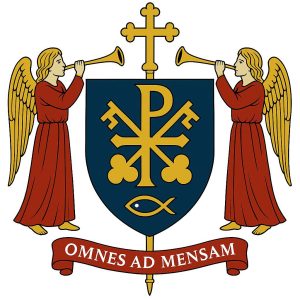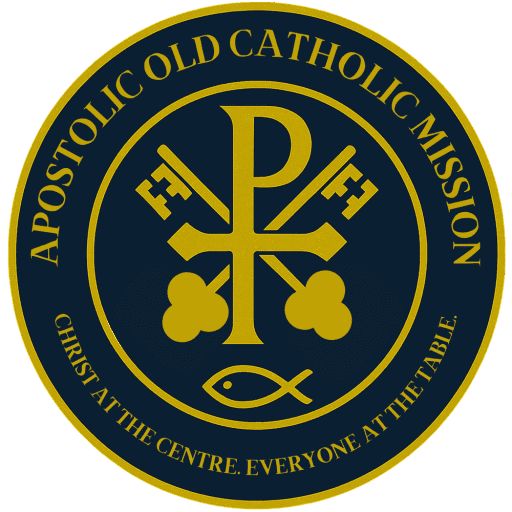Ecumenical Relationships
We walk in friendship, not isolation —
engaging in ecumenical relationships that honour Christ,
welcome dialogue, and reflect shared purpose.
Rooted in Apostolic Care, Reaching Out in Friendship
Our Ecumenical Commitment
The Apostolic Old Catholic Mission is an independent sacramental community rooted in the catholic tradition and in the faith of the early, undivided Church. We confess the one, holy, catholic, and apostolic Church and we believe that all who share the apostolic faith, celebrate the sacraments, and live from the grace of Christ already belong to that one Church.
Guided by our formal Statutes, our commitment to Christian unity is a foundational and disciplined aspect of our life as a Church.
Our motto expresses this clearly: Christ at the Centre. Everyone at the Table.
What this means:
- Ecumenism, for us, is not a project or hobby. It is a natural consequence of believing that Christ has only one Body, and that this Body is larger than any single jurisdiction or structure.
- We affirm the real Christian life and sacramental grace present in many other churches and communities.
- Where the apostolic faith is proclaimed and the sacraments are celebrated with right form, matter, and intention (aligning with our core doctrine and ecclesial identity), we recognise our brothers and sisters in Christ — even when we are not institutionally united.
In practice, this means:
We approach other churches with humility, not rivalry.
We recognise the validity of sacraments in many Roman Catholic, Eastern Orthodox, Anglican, Old Catholic, and independent sacramental communities.
We seek (ecumenical and working) collaboration where there is shared faith, shared sacraments, and shared pastoral concern, especially for those who are marginalised or left without care.
We are not interested in competition, title-collecting, or “proving” that we are more Catholic than anyone else. Our concern is the Gospel and the people we are called to serve.
From Signed Agreements to Lived Communion
In the past, the Mission entered into written ecumenical (communion) agreements with other jurisdictions. After further prayer and discernment, we have decided not to use formal intercommunion instruments going forward.
Our current policy is simple:
- We no longer enter into or maintain formal ecumenical (intercommunion agreements) with other churches.
- Where we recognise a shared apostolic faith and sacramental life, we simply live in communion through prayer, sacramental hospitality, and friendship.
- We believe that ecumenical unity is best expressed in shared worship, mutual respect, and honest collaboration, rather than in additional documents layered on top of the Nicene Creed.
This is not a rejection of any particular church, nor a break in charity. It is a decision about how we express unity: with less paperwork, less complexity, and more lived relationship.
Whether formal or informal, all our relationships are grounded in mutual respect and a shared hope for the Church’s healing and renewal. We affirm the spirit of the Lima Document (Baptism, Eucharist and Ministry, World Council of Churches, 1982), which calls the churches to visible unity through shared sacraments, ministry, and confession of faith — even as we remain realistic about differences that still exist. You can read the Lima Agreement here.
Key Partner Churches
Within this broader approach, there are churches with whom we share a particularly close bond.
The Apostolic Catholic Church (ACC)
We enjoy a deep spiritual and pastoral friendship with the Apostolic Catholic Church, led by Archbishop Ronald Saunders. Our Rector serves as Bishop-Elect within the ACC, and Archbishop Ronald acts as the Mission’s sacramental bishop: offering episcopal care, sacramental oversight, and external accountability in the Catholic tradition.
This means that, while the Mission remains a distinct independent sacramental community, our sacramental life, formation, and pastoral practice are intentionally aligned with the Apostolic Catholic Church. We pray together, consult one another, and collaborate where possible, especially in the care of clergy and communities who might otherwise be left without support.
Our present discernment is moving in the direction of deepening this relationship over time. Any future developments in our formal status will simply give clearer canonical expression to the reality that already exists in our common faith, shared sacraments, and close working partnership with Archbishop Ronald and the Apostolic Catholic Church.
Bulgarian Old Catholic Church (BOCC) – Historical Link
The Apostolic Old Catholic Mission first emerged under the blessing of the Bulgarian Old Catholic Church, from whom we received apostolic succession and early encouragement. We remain grateful for that foundation and now relate to the BOCC in a fraternal and cordial way, expressed chiefly through mutual goodwill and occasional collaboration. The Mission shapes its own pastoral, theological, and liturgical life, and is not dependent on the BOCC for its day-to-day governance or sacramental discipline.
A Generous Yet Discerning Ecumenism
Because we stand within the independent sacramental movement, we are acutely aware of its strengths and dangers. There are many sincere communities and clergy; there are also unstable groups, personality-driven structures, and bodies built around grandiose titles or invented honours.
For that reason:
- We value communio — real fellowship and accountability — over loose networks or vanity projects.
- We do not recognise self-styled noble, chivalric, or “micronational” titles as having any ecclesial weight, and we avoid relationships built around prestige, fantasy honours, or invented sovereignties rather than service.
- We will not compromise on core matters such as sacramental theology, apostolic succession, safeguarding, and pastoral integrity, even in the name of “unity”.
We seek communion where possible, mutual respect where not, and charity always.
Why This Matters
We have read and heard about many people being told that the sacraments they have received “do not count” or that their clergy are “not real”. Others have been warned that receiving the Eucharist outside certain structures is a sin. We reject these fear-based approaches.
We believe:
- There is one baptism into Christ.
- The Eucharist is the gift of Christ to his Church, not the property of any single denomination.
- True unity is found in Christ himself, not in human labels or politics.
Here at the Apostolic Old Catholic Mission, we will continue to build relationships that honour this vision — quietly, carefully, and with our eyes fixed on the Lord who prayed that we all may be one.
Christ at the Centre. Everyone at the Table.


